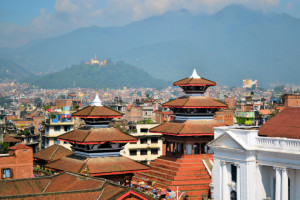 Saturday, April 18, 2015 will forever be a dark day in the history of Nepal. On this date, a deadly 7.9 magnitude earthquake struck the country. Nepal is located in one of the most seismically hazardous regions in the world and the disaster was not a huge surprise to experts. The death toll is already over 5,000 people and may climb as high as 8,000. The epicenter was a remote village in the western part of the country. However, the quake has impacted all of Nepal. Nineteen climbers were killed and over 60 more seriously injured on Mt. Everest by a series of avalanches that were triggered. Many Nepalese houses that were constructed of dirt and bricks, and were decades old, collapsed during the disaster. In the days immediately following the tragedy, relief efforts have been slow and sporadic. Some of the most far-flung areas of Nepal have been inaccessible. There is a large-scale humanitarian crisis occurring throughout this already poor country and much assistance is still required to help those in need. The vast majority of people impacted by the earthquake are Hindus. Their religious beliefs, including ones about catastrophes and suffering, can vary widely from those of Christians.
Saturday, April 18, 2015 will forever be a dark day in the history of Nepal. On this date, a deadly 7.9 magnitude earthquake struck the country. Nepal is located in one of the most seismically hazardous regions in the world and the disaster was not a huge surprise to experts. The death toll is already over 5,000 people and may climb as high as 8,000. The epicenter was a remote village in the western part of the country. However, the quake has impacted all of Nepal. Nineteen climbers were killed and over 60 more seriously injured on Mt. Everest by a series of avalanches that were triggered. Many Nepalese houses that were constructed of dirt and bricks, and were decades old, collapsed during the disaster. In the days immediately following the tragedy, relief efforts have been slow and sporadic. Some of the most far-flung areas of Nepal have been inaccessible. There is a large-scale humanitarian crisis occurring throughout this already poor country and much assistance is still required to help those in need. The vast majority of people impacted by the earthquake are Hindus. Their religious beliefs, including ones about catastrophes and suffering, can vary widely from those of Christians.
Hinduism and Christianity
There are numerous differences between Hinduism and Christianity, and few similarities. Hinduism is one of the world’s oldest religions and its beginning precedes human history. It has no human founder and is considered by many to be a highly complex, diverse, mystical religion. Hindus have millions of gods who are immune to suffering. They often blame their gods for tragedy and disaster. Following are a few of their beliefs:
- There is one Supreme Being.
- There are four divine texts known has Vedas, which are the oldest scriptures in the world. They have been described as a history-based religious mythology.
- Karma is central to the lives of Hindus and involves the principle of cause and effect; individuals create their own destinies based on what they think, say and do.
- Reincarnation, or the belief that one’s soul lives many lives, is also important to Hindus.
Christianity is based on another belief system; there is an established beginning of the religion and God and Christ are the only deities. While there are a variety of Christian denominations such as Catholicism, Anglicanism and Lutheranism, all Christians worship one God. In times of disaster, they often pray to God and Jesus Christ for strength and relief from suffering. Jesus is considered by many to be a more compassionate and sympathetic figure to those in pain because he was crucified, and understands anguish. Christian beliefs include:
- There is one God and His son is Jesus Christ.
- Christ died on the cross so people will be forgiven for their sins.
- Man’s salvation comes from Christ alone.
- The Bible is the only scripture of Christianity and it teaches that God created the Earth and all the Earth’s creatures.
- Man is made from God’s image and lives only one life.
Destruction of Ancient Temples in Kathmandu Valley
Another tragedy of the earthquake is the annihilation of many 16th to 18th century temples built in the Kathmandu Valley. The region is located in central Nepal and was particularly hard hit. It includes Kathmandu, Bhaktapur and Lalitpur, some of the largest and most densely populated cities in the country. The temples were protected historical sites and popular tourist attractions. Many were totally destroyed or badly damaged.
The catastrophe in Nepal is still unfolding and it may take some time before the full scope of death and devastation is known. Hindus are far and away the largest religious group impacted by the earthquake. While they may hold different beliefs from many other people, hopefully compassion is a theme that can connect anyone involved in this disaster.

